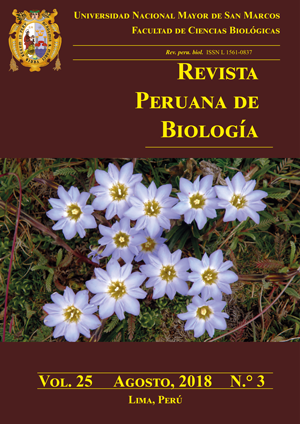Nonzygotic Embryogenesis in Passiflora maliformis
DOI:
https://doi.org/10.15381/rpb.v25i3.15211Keywords:
Somatic embryogenesis, In vitro, morphogenesis, somatic regenerants, passion fruit.Abstract
The economic, ecological and medical significance of passion fruits has encouraged the development of multidisciplinary research in this group. In vitro culture, non-zygotic embryogenesis represents an alternative for plant regeneration; however, this technique has presented difficulties in the reproducibility of protocols as well as the development of certain embryos and abnormal plantlets in some species. We assessed in Passiflora maliformis L the morphogenic capacity in the mature zygotic embryos (MZE) to develop non-zygotic embryos (NZE), and subsequent plantlets regeneration. We tested an induction stage with 12 treatments in MS + VitB5 medium supplemented with 2,4-D, KIN and BA added alone or combined and, another with a MS, MS with Activated Charcoal (AC) or MS with growth regulators (GR) in 1/10 concentrations reduced to 1/10 of those added in the induction stage. We obtained high percentages, 70%, of regenerants in the medium supplemented with 1 mgL-1 BA and transferred to the MS expression medium, as well as in the medium with 1 mgL-1 BA + 3 mgL-1 2,4-D, and transferred to the expression medium with AC, 60%. 70% of the regenerated seedlings were successfully grown in the greenhouse. This is the first research that addresses the expression of the MZE embryogenic potential in P. maliformis, inducing a successfully embryogenic non-zygotic responses through direct and indirect routes; the obtained results are relevant to the knowledge of non-zygotic embryogenesis in other passion fruits, for breeding and commercial uses.Downloads
Downloads
Published
Issue
Section
License
Copyright (c) 2018 Sandra Carolina Bernal Moreno, Lyda Catherine Duarte Rodríguez, María de los Angeles Bohórquez Quintero, Eyda Johanna Araque, José Constantino Pacheco

This work is licensed under a Creative Commons Attribution-NonCommercial-ShareAlike 4.0 International License.
AUTHORS RETAIN THEIR RIGHTS:
a. Authors retain their trade mark rights and patent, and also on any process or procedure described in the article.
b. Authors retain their right to share, copy, distribute, perform and publicly communicate their article (eg, to place their article in an institutional repository or publish it in a book), with an acknowledgment of its initial publication in the Revista Peruana de Biologia.
c. Authors retain theirs right to make a subsequent publication of their work, to use the article or any part thereof (eg a compilation of his papers, lecture notes, thesis, or a book), always indicating its initial publication in the Revista Peruana de Biologia (the originator of the work, journal, volume, number and date).






